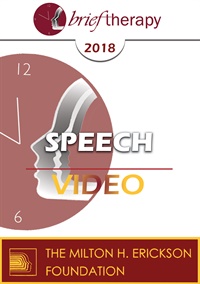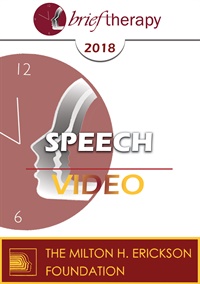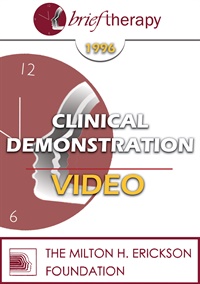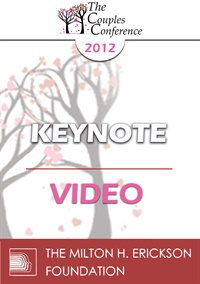
- Average Rating:
- Not yet rated
- Topic Areas:
- Special Topics | Hypnosis | Ericksonian Hypnosis and Therapy Techniques | Fundamentals of Hypnosis | Psychotherapy | Truisms | Age Regression | Hypnotic Phenomena | Post-Hypnotic Suggestion | Suggestion | Metaphors
- Categories:
- Brief Therapy Conference | Brief Therapy Conference 2018
- Faculty:
- Brent Geary, PhD
- Duration:
- 5:14:31
- Format:
- Audio Only
- Original Program Date:
- Dec 05, 2018
- Short Description:
- This workshop will provide participants with an introduction to the key concepts and techniques of practice in Ericksonian hypnosis. A brief biography of Erickson’s professional life will provide perspective on the extensive contributions he made to the fields of hypnosis and psychotherapy. Terminology of hypnosis will be explained and various approaches to induction will be described and demonstrated. The process of a typical hypnotic session will be outlined. Considerable attention will be afforded the hypnotic phenomena, the essential mechanisms in hypnotic therapy. Erickson’s landmark concepts of utilization and indirection will be explored with particular focus on the use of therapeutic anecdotes and metaphors.
- Price:
- $15.00 - Base Price
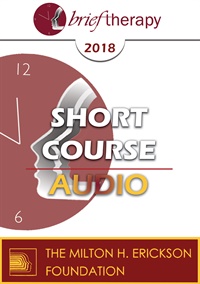
- Average Rating:
- Not yet rated
- Topic Areas:
- Short Courses | Brief Therapy | Psychotherapy
- Categories:
- Brief Therapy Conference | Brief Therapy Conference 2018
- Faculty:
- Melanie McGhee, LCSW
- Duration:
- 1:28:08
- Format:
- Audio Only
- Original Program Date:
- Dec 06, 2018
- Short Description:
- After a brief exploration of the six principles of Acceptance and Integration Training, participants will learn a simple method for helping clients recognize distorted thoughts AS distorted.
- Price:
- $15.00 - Base Price
Tags: Brief Therapy Psychotherapy
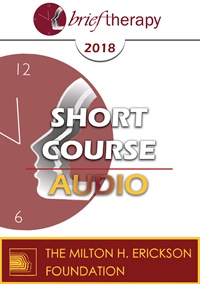
- Average Rating:
- Not yet rated
- Topic Areas:
- Short Courses | Dreamwork | Psychotherapy | Brief Therapy | Consciousness
- Categories:
- Brief Therapy Conference | Brief Therapy Conference 2018
- Faculty:
- Bruce Fordham, MA/CMHC
- Duration:
- 1:25:38
- Format:
- Audio Only
- Original Program Date:
- Dec 06, 2018
- Short Description:
- This workshop will provide a basic understanding of how to utilize dreamwork in psychotherapy, thereby providing an excellent alternative for patient care - especially when a patient's defenses are strong.
- Price:
- $15.00 - Base Price
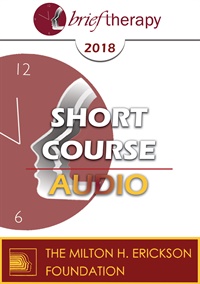
- Average Rating:
- Not yet rated
- Topic Areas:
- Short Courses | Brief Therapy | Art and Creativity | Psychotherapy | Solution Oriented Approach
- Categories:
- Brief Therapy Conference | Brief Therapy Conference 2018
- Faculty:
- George Ferrick, MA
- Duration:
- 1:24:31
- Format:
- Audio Only
- Original Program Date:
- Dec 06, 2018
- Short Description:
- This workshop will describe strategies and approaches adapted from brief and solution focused therapy. These enhanced mediation with creative ways to set a tone and reduce anxiety and resistance; to give voice to participants while getting to the heart of the matter; to unlock narrow positions, break through impasses, move to broader viewpoints, and co-create solutions.
- Price:
- $15.00 - Base Price
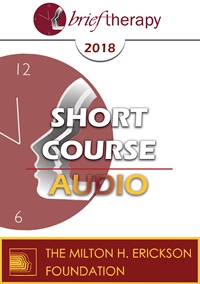
- Average Rating:
- Not yet rated
- Topic Areas:
- Short Courses | Humor | Psychotherapy | Brief Therapy | Relationships
- Categories:
- Brief Therapy Conference | Brief Therapy Conference 2018
- Faculty:
- Steven Sultanoff, Psychologist
- Duration:
- 1:18:02
- Format:
- Audio Only
- Original Program Date:
- Dec 06, 2018
- Short Description:
- Integrating therapeutic humor into psychotherapy is more than simply using humor with clients. This presentation will explore how and why integrating humor into clinical practice can be effective as well as assist clinicians to use humor with clinical awareness. Participants will learn a model of clinical humor that provides a foundation for the use of humor in psychotherapy and discover how humor (when purposely chosen as a clinical intervention) can be used as a relationship enhancing intervention, as well as a diagnostic and treatment tool.
- Price:
- $15.00 - Base Price
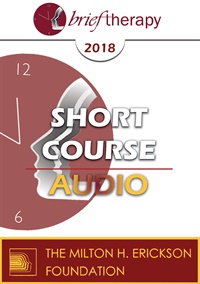
- Average Rating:
- Not yet rated
- Topic Areas:
- Short Courses | Psychotherapy | Awareness Integration Model | Brief Therapy | Anxiety | Depression
- Categories:
- Brief Therapy Conference | Brief Therapy Conference 2018
- Faculty:
- Foojan Zeine, Psy.D., MFT
- Duration:
- 1:16:41
- Format:
- Audio Only
- Original Program Date:
- Dec 06, 2018
- Short Description:
- The clinical method of the Awareness Integration model has evolved from Cognitive, emotional, Behavioral, body-oriented, and trauma releasing theories and has been researched with a diverse population with significant results toward minimizing Depression and Anxiety.
- Price:
- $15.00 - Base Price
Credit available - Click Here for more information
- Average Rating:
- Not yet rated
- Topic Areas:
- Speeches | Brief Therapy | Neuroscience | Psychotherapy | Therapist Development
- Categories:
- Brief Therapy Conference | Brief Therapy Conference 2018 | Online Continuing Education
- Faculty:
- Michael Yapko, PhD
- Course Levels:
- Master Degree or Higher in Health-Related Field
- Duration:
- 1:02:31
- Format:
- Audio and Video
- Original Program Date:
- Dec 09, 2018
- Short Description:
- Conventional wisdom can guide us but also confuse us when seemingly good pieces of advice contradict each other (e.g., “Look before you leap…BUT he who hesitates is lost”). How can someone know when to do this rather than do that? How can we help clients make better decisions in order to improve the quality of their lives? The fields of cognitive neuroscience and phenomenology have offered us many insights into decision-making processes and some of these will be discussed as they apply to the context of active, short-term psychotherapies.
- Price:
-
Sale is $29.00
price reduced from Base Price - $59.00
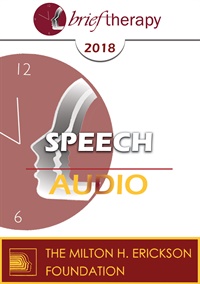
- Average Rating:
- Not yet rated
- Topic Areas:
- Speeches | Brief Therapy | Psychotherapy | Solution Oriented Approach
- Categories:
- Brief Therapy Conference | Brief Therapy Conference 2018
- Faculty:
- Elliott Connie, MA, LPC
- Duration:
- 59:30
- Format:
- Audio Only
- Original Program Date:
- Dec 09, 2018
- Short Description:
- The Solution Focused Approach is a widely accepted way of conducted psychotherapy sessions. Over the past 40 years this approach has come to be known for its brevity, pragmatism and positive stance. However, many inaccurate myths about this approach exist which impact many clinicians' ability to understand, and subsequently use, this approach. There is one misunderstanding that stands above all others, and this workshop will directly address this common misunderstanding while showing to not succumb to this idea and how to follow the true essence of Solution Focused work.
- Price:
- $15.00 - Base Price
Credit available - Click Here for more information
- Average Rating:
- Not yet rated
- Topic Areas:
- Speeches | Psychotherapy | Art and Creativity | Brief Therapy | Resources
- Categories:
- Brief Therapy Conference | Brief Therapy Conference 2018 | Online Continuing Education
- Faculty:
- Stephen Gilligan, PhD
- Course Levels:
- Master Degree or Higher in Health-Related Field
- Duration:
- 1:01:12
- Format:
- Audio and Video
- Original Program Date:
- Dec 09, 2018
- Short Description:
- Therapy is successful when clients are able to experience significantly changed realities. While the identification and transformation of symptoms is important in this regard, the activation of the client's creative capacity to make positive changes is even more important. This paper will explore how the 6-step model of Generative Psychotherapy provides a disciplined yet flexible process for helping clients claim and use their agency for creative change.
- Price:
-
Sale is $29.00
price reduced from Base Price - $59.00
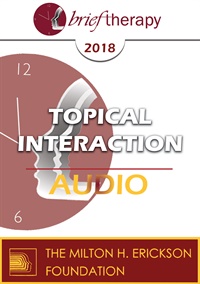
- Average Rating:
- Not yet rated
- Topic Areas:
- Topical Interactions | Brief Therapy | Psychotherapy | Hypnosis | Hypnotic Phenomena
- Categories:
- Brief Therapy Conference | Brief Therapy Conference 2018
- Faculty:
- Michael Yapko, PhD
- Duration:
- 1:00:04
- Format:
- Audio Only
- Original Program Date:
- Dec 08, 2018
- Short Description:
- This presentation will allow for a dialog with attendees regarding the merits of hypnosis, the ways it can be applied clinically, the differences between laboratory and clinical effects on hypnotic responsiveness, and other topics of interest regarding hypnosis.
- Price:
- $15.00 - Base Price
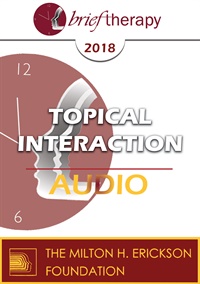
- Average Rating:
- Not yet rated
- Topic Areas:
- Topical Interactions | Psychotherapy | Brief Therapy | Therapeutic Relationship | Therapist Development
- Categories:
- Brief Therapy Conference | Brief Therapy Conference 2018
- Faculty:
- Stephen Gilligan, PhD
- Duration:
- 1:04:33
- Format:
- Audio Only
- Original Program Date:
- Dec 08, 2018
- Short Description:
- Every meaningful therapy conversation includes a significant presence of difficult emotions--symptoms, responses, anger, fear, etc. We will have a conversation about how to skillfully welcome and utilize such negative experiences as integral parts of a successful, creative therapy.
- Price:
- $15.00 - Base Price
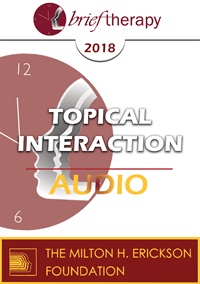
- Average Rating:
- Not yet rated
- Topic Areas:
- Topical Interactions | Psychotherapy | Femininity | Supervision
- Categories:
- Brief Therapy Conference | Brief Therapy Conference 2018
- Faculty:
- Laura Brown, PhD
- Duration:
- 57:06
- Format:
- Audio Only
- Original Program Date:
- Dec 08, 2018
- Short Description:
- There is a dynamic tension between the necessarily hierarchical structure of psychotherapy supervision and the liberatory/egalitarian models of feminist and other liberatory practices. This will be a chance for psychotherapy supervisors who are struggling with this dilemma to discuss this topic with the author of the feminist model of psychotherapy supervision
- Price:
- $15.00 - Base Price
Tags: Feminine Psychotherapy Supervision
Credit available - Click Here for more information
- Average Rating:
- Not yet rated
- Topic Areas:
- Workshops | Brief Therapy | Evocative Communication | Metaphors | Strategic Therapy | Utilization | Psychotherapy
- Categories:
- Brief Therapy Conference | Brief Therapy Conference 2018 | Online Continuing Education
- Faculty:
- Jeffrey Zeig, PhD
- Course Levels:
- Master Degree or Higher in Health-Related Field
- Duration:
- 1:45:53
- Format:
- Audio and Video
- Original Program Date:
- Dec 07, 2018
- Short Description:
- Three evocative orientations to psychotherapy, utilization, using metaphor, and strategic development, will be explained, demonstrated and practiced. There are components to each of these methods that will be addressed.
- Price:
-
Sale is $29.00
price reduced from Base Price - $59.00

- Average Rating:
- Not yet rated
- Topic Areas:
- Workshops | Brief Therapy | Generative Psychotherapy | Psychotherapy | Relationships | Therapist Development
- Categories:
- Brief Therapy Conference | Brief Therapy Conference 2018
- Faculty:
- Robert Dilts, BA
- Duration:
- 2:01:29
- Format:
- Audio Only
- Original Program Date:
- Dec 07, 2018
- Short Description:
- BT18 Workshop 14 - Applying Principles of Generative Coaching to Brief Therapy - Robert Dilts The core focus in Generative Coaching is creativity: How do you create a successful and meaningful work life? How do you create great personal relationships? How do you develop a great relationship with yourself—your body, your past, your future, your wounds, and your gifts? Generative change means creating something beyond what currently exists, whether in personal or professional life. It is not merely a cosmetic change, but a contextual shift that allows new levels of performance. Generative Coaching focuses on how to build the generative states needed to produce change and on how to maintain these states in order transform the obstacles and barriers that will inevitably arise.
- Price:
- $15.00 - Base Price
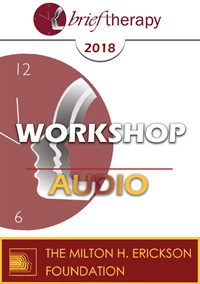
- Average Rating:
- Not yet rated
- Topic Areas:
- Workshops | Single-Session | Brief Therapy | Psychotherapy | Therapist Development
- Categories:
- Brief Therapy Conference | Brief Therapy Conference 2018
- Faculty:
- Michael Hoyt, PhD
- Duration:
- 1:35:35
- Format:
- Audio Only
- Original Program Date:
- Dec 07, 2018
- Short Description:
- Many therapies involve very brief lengths of treatment, including one session. A structure will be presented for organizing the tasks and skills involved in different phases (pre-, early, middle, late, follow-through) of therapy. Numerous case examples, including some on video, will illustrate brief therapy techniques applicable in both initial sessions and in the course of longer treatments.
- Price:
- $15.00 - Base Price
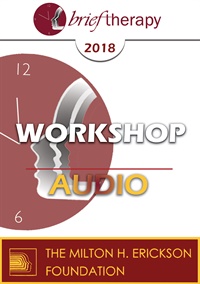
- Average Rating:
- Not yet rated
- Topic Areas:
- Workshops | Tailoring | Mindfulness | Psychotherapy | Brief Therapy
- Categories:
- Brief Therapy Conference | Brief Therapy Conference 2018
- Faculty:
- Ronald Siegel, PsyD
- Duration:
- 1:56:11
- Format:
- Audio Only
- Original Program Date:
- Dec 07, 2018
- Short Description:
- Mindfulness and compassion practices hold great promise not only for our own personal development, but also as remarkably powerful tools to augment virtually every form of psychotherapy. They are not, however, one-size-fits-all remedies. Practices need to be tailored to fit the needs of particular individuals—and this presentation will show you how to creatively adapt them to meet the needs of diverse people and conditions.
- Price:
- $15.00 - Base Price
- Average Rating:
- Not yet rated
- Topic Areas:
- Clinical Demonstrations | Ericksonian Psychotherapy | Psychotherapy | Brief Therapy
- Categories:
- Brief Therapy Conference | Brief Therapy Conference 1996
- Faculty:
- Jeffrey Zeig, PhD
- Course Levels:
- Master Degree or Higher in Health-Related Field
- Duration:
- 59:09
- Format:
- Audio and Video
- Original Program Date:
- Dec 13, 1996
- Short Description:
- BT96 Clinical Demonstration 01 - Brief Ericksonian Psychotherapy - Jeffrey Zeig, PhD
- Price:
-
Sale is $29.00
price reduced from Base Price - $59.00
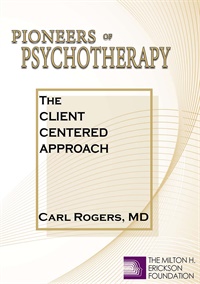
- Average Rating:
- Not yet rated
- Topic Areas:
- Clinical Demonstrations | Psychotherapy | Family Therapy
- Bundle(s):
- Pioneers of Psychotherapy Bundle
- Categories:
- Pioneers of Psychotherapy | Evolution of Psychotherapy | Evolution of Psychotherapy 1985
- Faculty:
- Carl Rogers, PhD
- Course Levels:
- Master Degree or Higher in Health-Related Field
- Duration:
- 00:59:00
- Format:
- Audio and Video
- Original Program Date:
- Dec 10, 1985
- Short Description:
- Carl Rogers (1985) demonstrates with Ann, who describes herself as suffering guilt and sadness after having put off becoming a mother to pursue her career. After deciding to have children, she miscarried twins and has since been unable to become pregnant. Rogers helps her access her own potential to experience herself more positively.
- Price:
- $59.00 - Base Price
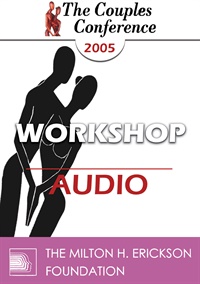
- Average Rating:
- Not yet rated
- Topic Areas:
- Workshops | Couples Therapy | Developmental Therapy Model | Confrontation | Therapist Development | Family Systems | Motivation | Therapist Techniques | Psychotherapy
- Categories:
- Couples Conference | Couples Conference 2005 | Pioneers in Couples and Family Therapy
- Faculty:
- Ellyn Bader, PhD
- Duration:
- 1:45:16
- Format:
- Audio Only
- Original Program Date:
- Mar 05, 2005
- Short Description:
- A comprehensive workshop exploring effective couples therapy techniques. Learn to address relationship challenges through a developmental model focusing on breaking negative cycles, setting goals, and fostering individual growth. Includes practical strategies for therapist engagement, self-assessment homework, and skill-building interventions to help couples move beyond blame and reconnect.
- Price:
- $15.00 - Base Price
Tags: Confrontation Couples Therapy Therapist Development Developmental Therapy Model Autonomy Emotional Connection Emotional Growth Experiential Learning Pattern Interruption Reframing Relationship Dynamics Strategic Interventions Tailoring Therapeutic Alliance Therapeutic Experimentation Utilization Goal Setting Negative Cycles Skill Development Self-Assessment Destructive Cycle Communication Skills Relationship Goals Emotional Work Conflict Resolution
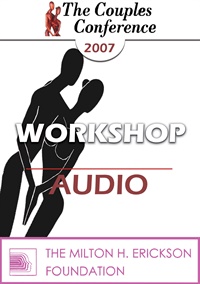
- Average Rating:
- Not yet rated
- Topic Areas:
- Workshops | Confrontation | Couples Therapy | Behavioral Psychology | Developmental Therapy Model | Family Systems | Psychoanalysis | Psychotherapy | Relationships | Therapist Techniques | Training
- Categories:
- Couples Conference | Couples Conference 2007 | Pioneers in Couples and Family Therapy
- Faculty:
- Ellyn Bader, PhD
- Duration:
- 1:48:02
- Format:
- Audio Only
- Original Program Date:
- Apr 27, 2007
- Short Description:
- Bader reveals six confrontation styles—from gentle interventions to powerful 'bombshell' techniques—that help therapists challenge clients while maintaining therapeutic rapport. Learn how strategic confrontation can transform relationship dynamics and support couples' growth.
- Price:
- $15.00 - Base Price
Tags: Confrontation Couples Therapy Emotional Growth Empathy Experiential Learning Family Systems Hypnotic Communication Observation Pattern Interruption Rapport Reframing Self-Organizing Change Tailoring Therapeutic Alliance Validation Creative Confrontation Defensive Cycles Emotional Accountability Intrapsychic Issues Negative Patterns Empathic Confrontation Passive Aggression Symbiotic Relationships Grief Processing Self-Respect Building Role Play
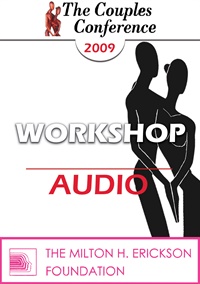
- Average Rating:
- Not yet rated
- Topic Areas:
- Workshops | Couples Therapy | Intimacy | Avoidant | Addiction | Attachment | Behavioral Therapy | Family Systems | Neuroscience | Psychoanalysis | Psychotherapy | Trauma Studies
- Categories:
- Couples Conference | Couples Conference 2009 | Pioneers in Couples and Family Therapy
- Faculty:
- Ellyn Bader, PhD
- Duration:
- 1:23:01
- Format:
- Audio Only
- Original Program Date:
- May 02, 2009
- Short Description:
- A comprehensive workshop exploring intimacy avoidance in couples, revealing therapeutic strategies to help partners overcome fear of vulnerability, challenge core beliefs, and develop deeper emotional connections through authentic communication and courageous self-exposure.
- Price:
- $15.00 - Base Price
Tags: Avoidant Couples Therapy Intimacy Addiction Anxiety Attunement Conflict Avoidance Differentiation Domestic Violence Emotional Growth Experiential Therapy Hostile Couples Observation Pattern Interruption Phenomenological Approach Rapport Self-Discovery Symbiotic Relationships Therapeutic Alliance Trauma Validation Vulnerability Intimacy Avoidance Emotional Withdrawal Emotional Tension Substance Use
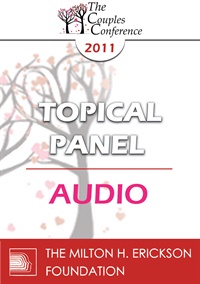
- Average Rating:
- Not yet rated
- Topic Areas:
- Topical Panels | Couples Therapy | Internal Family Systems (IFS) | Parts Work | Experiential Therapy | Psychotherapy
- Categories:
- Couples Conference | Couples Conference 2011 | Pioneers in Couples and Family Therapy
- Faculty:
- Jeffrey Zeig, PhD | Richard Schwartz, PhD | Stan Tatkin, PsyD, MFT
- Duration:
- 1:05:16
- Format:
- Audio Only
- Original Program Date:
- Apr 02, 2011
- Short Description:
- This panel explores the Internal Family Systems (IFS) model, focusing on the idea of "parts" as subpersonalities that shape how individuals cope and relate. Speakers examine the roles of protectors and exiles, and how mindful, regulated states can foster change. They compare similar concepts from other models, including transactional analysis and object relations, and discuss tools like enactments and hypnosis to help clients access and work with their parts.
- Price:
- $15.00 - Base Price
- Average Rating:
- Not yet rated
- Topic Areas:
- Psychotherapy | Keynotes | Intimacy | Mindfulness | Love | Couples Therapy | Neuroscience
- Categories:
- Couples Conference | Couples Conference 2012
- Faculty:
- Rick Hanson, PhD
- Course Levels:
- Master Degree or Higher in Health-Related Field
- Duration:
- 59:50
- Format:
- Audio and Video
- Original Program Date:
- Apr 29, 2012
- Short Description:
- To compensate for the brain’s innate negativity bias – making it like Velcro for negative experiences but Teflon for positive ones, which sensitizes couples to hurts and conflicts and undermines psychotherapy – we’ll explore a vital method in self-directed neuroplasticity: identifying key positive experiences and then registering them deeply in implicit memory.
- Price:
-
Sale is $29.00
price reduced from Base Price - $59.00
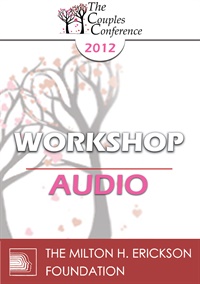
- Average Rating:
- Not yet rated
- Topic Areas:
- Couples Therapy | Workshops | Psychobiological Approach to Couples Therapy (PACT) | Psychotherapy | Communication
- Categories:
- Couples Conference | Couples Conference 2012 | Pioneers in Couples and Family Therapy
- Faculty:
- Stan Tatkin, PsyD, MFT
- Duration:
- 1:28:49
- Format:
- Audio Only
- Original Program Date:
- Apr 27, 2012
- Short Description:
- Introduces a psychobiological approach to couple therapy that shifts from insight-based to experiential methods. Using bottom-up techniques—like surprise interventions, movement, and the Lover’s Pose—therapists can access implicit systems through micro-expressions and body cues, helping couples regulate arousal, deepen attachment, and build secure-functioning relationships.
- Price:
- $15.00 - Base Price
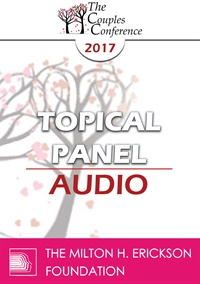
- Average Rating:
- Not yet rated
- Topic Areas:
- Couples Therapy | Topical Panels | Therapist Development | Addiction | Behavioral Therapy | Clinical Psychology | Family Therapy | Psychotherapy
- Categories:
- Couples Conference | Couples Conference 2017 | Pioneers in Couples and Family Therapy
- Faculty:
- Ellyn Bader, PhD | Sue Diamond, MA, RCC | Janis Abrahms Spring, PhD, ABPP
- Duration:
- 58:21
- Format:
- Audio Only
- Original Program Date:
- Apr 01, 2017
- Short Description:
- Couples treatment requires an understanding of interpersonal dynamics. Clinicians need to understand the benefits and liabilities of couples vs. individual therapy, and have a mechanism for deciding when to use each approach.
- Price:
- $15.00 - Base Price
Tags: Couples Therapy Therapist Development Addiction Destabilization Ethics Hypnotic Communication Phenomenological Approach Strategic Therapy Substance Use Therapeutic Experimentation Utilization Interpersonal Dynamics Addiction Treatment Open Secrets Policy Therapist Confidentiality Relationship Problems


